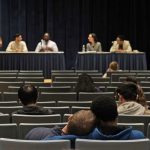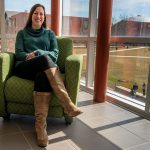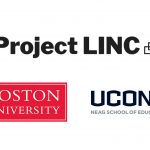“As a researcher who has examined masculinity in college fraternities, I conclude that the reason these efforts have not succeeded is because they fail to deal with the fact that drinking alcohol – and other risky behaviors – are deeply embedded in society’s notions about what it means to be a man,” says Adam McCready.
When you think of the word “creativity,” do you associate it primarily with women or with men? Do you shout out “Sistine Chapel” or “quilts”? Do you point toward the flash card showing a lone man with a light bulb over his head, or do you choose the one depicting a group of laughing women gathered at a table? Do you see a woman writing a book, a man designing a suit, a woman discovering a new galaxy or a man dancing?
The Neag School community honored more than 150 Neag School student scholarship recipients last month at the School’s Annual Scholarship Awards Celebration, many of whom attended the celebratory luncheon in Rome Commons Ballroom with their family and friends.
USG and Student Health and Wellness held a panel about college mental health Thursday in honor of World Mental Health Day. The four panelists — mental health professionals Dr. Sarah Ketchen Lipson and Dr. Clewiston Challenger and UConn students Kanu Caplash and Jovanni Vicenty — came together to give different perspectives and levels of expertise to discuss the topic.
Joseph Renzulli popped up prominently once again in NYC politics just before the start of this school year, with the release of a bombshell education report from a group set up by Mayor Bill de Blasio. The report advised swift action to desegregate schools, including the general elimination of gifted and talented screening as currently done.
Devin Kearns began his career as a general education elementary school teacher for third-graders in Los Angeles, where he noticed many students had difficulty reading. The observation would lead to a dramatic shift in the trajectory of his work.
Neag School educational psychology faculty have secured more than $5 million in federal funding through the U.S. Department of Education’s Jacob K. Javits Gifted and Talented Students Education Act for two new research projects centered on gifted education.
According to 2020 U.S. News & World Report rankings, the Neag School ranks among the top 20 public graduate schools of education in the nation and has five specialty programs ranked in the top 25 nationally: Special Education; Elementary Education; Educational Psychology; Educational Administration; and Secondary Education.
The U.S. Department of Education has awarded $2.5 million in funding through its Office of Special Education Programs (OSEP) to special education faculty at Boston University’s Wheelock College of Education & Human Development and UConn’s Neag School of Education for a project that will fully fund five doctoral students at each institution over the next five years.
Dyslexia makes reading a struggle for millions of people, but the learning disability is rarely diagnosed before age seven. Now, a team of educators and scientists led by UConn professors has made a game-like app that could help teachers identify younger kids at risk.






